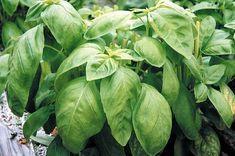
Swedeponic’s managing director Mark Powell says that the herb market is finally receiving the recognition it has long deserved. There has been considerable growth in the cut herb market and although potted herbs have had not the same kind of attention, this is currently being addressed.
Powell says: "Consumers are realising the benefits of adding herbs to their dishes, flavour and taste is becoming increasingly important to customers. By adding herbs to their meals, people are seeing how it can improve their cooking."
There have been some growth areas in the herb market in recent years and this can be attributed to changing consumer tastes. "Coriander is seeing continued growth due to the driving force of tikka masala as the UK's favourite dish," says Powell. "Our biggest seller is basil, followed closely by parsley. We are looking to increasing the interest in oregano and sage. We are doing this by including recipe cards with our herbs. Demand is continuing to rise due to the continued surge in popularity of the celebrity chef and the wide range of cooking programmes on television."
In 2003 the company produced more than 40 million herbs in seven countries. "We deal with most of the major multiples in Europe and we are hoping to increase on our volume of herbs this term," says Powell. "We have launched a new packaging ranges with Morrisons and are currently working with two other retailers on new launches for this summer. We have had to work closely with the stores, playing an instrumental role in the design of the packaging. The fluted bag is the best bag for potted herbs at the moment, reducing the effect of bruising and improved air-flow."
Last year Swedeponic became a part of the Swedish-based company Santa Maria. Although Santa Maria's heritage is dried herbs, the company has recently ventured into the ethnic food arena introducing a complete Mexican theme of meal solutions and the accompanying dips, chips and tortillas. "There are obvious synergies between the two companies," says Powell.
In a new venture the company has been working on a project which works on converting waste materials from processing companies such as Lingarden and Geest. Once materials have been converted they can be used to grow herbs in. Powell explains: "The company is about to commence running the scheme on a commercial basis and offering sustainable organic material for potted herbs. The project was overseen by Claire Donkin who was working on a student placement and due to its success she is now our technical manager."
Powell says that although there is little innovation within the market for new herbs to come through, one area, which could see potential growth, is the sector of organics herbs. He says: "Many consumers think all potted herbs are organic, but there is much educating to be done. We are operating trials to a sustainable level at the moment, and our site is the only Soil Association approved location in the UK."
The Bourne-based company feels that it benefits from its location. Powell says: "We are fortunate that we have good growing conditions in Lincolnshire. We are also looking to extend the shelf-life of our products from five to seven days. This is an important future area."
Over the years the herbs market has seen phenomenal growth. Powell says that the market is worth around £50-52 million a year at retail. "We want to address the dip in sales that we often experience between September and November. We are looking at introducing activities to improve this," Powell says.
Besides continuing to grow in its existing markets he adds that the company is looking to new areas for future success. He says: "There is a big potential for future development in countries such as Poland, Hungary and Latvia."
SAINSBURY’S OFFERS SAGE ADVICE
Sainsbury’s will be focusing on the health benefits of sage next month, with efforts aimed at inspiring customers to try and use herbs in traditional as well as more unusual dishes.
The store will be providing a host of ideas with recipes on the herb packaging and more tips and ideas in Sainsbury's magazine, one of the recipes included is pork and sage canederli with pancetta and fresh pears.
Sage, a native Mediterranean herb, is known for both its culinary and medicinal uses. The botanical word salvias translates to save and expresses the innumerable and medicinal uses our ancestors devised for this plant. It was considered to have substantial healing properties, particularly helpful in the digestion of ubiquitous fatty meals of the time. This is why sage has become known as a perfect ingredient for stuffings, especially with pork and duck.
Sainsbury's Victoria Foley says: "Sage is a great way to add variety and taste to your meal, herbs as we know also provide a host of health benefits. They can be an easy way to help with a healthy eating regime, making a delicious substitute for traditional seasonings such as salt."
The herb has narrow, oval, grey-green leaves which are slightly bitter and have a musty mint taste and aroma. An old English phrase is "Eat sage in May and you'll live for aye". People in rural England often used to attribute their longevity to sage tea in spring and fall, to sage sandwiches for supper and to chopped sage in their porridge.



